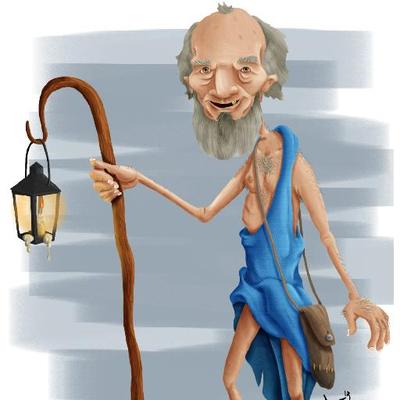

But perhaps the Manes anecdote could be placed a little earlier in the article so that is doesn't sound like he's a fully-practising Cynic at this point. And it was then in Athens that Diogenes first began practising Cynic aceticism. It was when he was exiled that he went to Athens with a slave, who then abandoned him. Was this cultural or was it only property that Diogenes eschewed? Philt54 ( talk) 10:27, 17 February 2009 (UTC) Reply He wasn't a Cynic philosopher when he lived in Sinope, he was just a banker's son. I maybe simplistic or missing the point but it seems ironic that Diogenes should have had a slave (Manes). funkendub 21:41, 17 December 2006 (UTC) Reply Slaves were often treated as members of the family but they nonetheless lacked citizenship and certainly were not paid for their labors. Sshadow 10:31, 6 July 2006 (UTC) Reply "Servant" would be a misnomer in this case, as Manes was Diogenes' slave. Nareek 22:29, 5 July 2006 (UTC) Reply Manes was Diogenes' servant he brought along to Athens from Sinope. "If Manes can live without Diogenes, why not Diogenes without Manes?"

I can say with a good degree of certainty that "the madman" who goes through the marketplace with a lantern "looking for god" is Nietzsche's then contemporary version of Diogenes who was said to have carried a lantern "looking for an honest man." I lack the grammatical cunning, ability to settle my schizophrenic writing tendencies and work ethic to add this bit to the article properly, but I hope that someone with more confidence than I (and hopefully just as much repect for the article) does. What does anybody know about Nietzche's The Gay Science? I think he was using Diogenes as a tool in in his famous "god is dead" passage. Shapiro 02:27, 27 September 2005 (UTC) Reply Īctually, there probably was no organized "school of cynics." The whole point of Cynicism was its emphasis of self-reliance. Like Socrates, he had an important impact not merely through his words but through is unconventional way of life. He was a member of the school of Cynics, who were highly critical of social mores as being in conflict with nature. 68.252.162.198 22:50, 26 September 2005 (UTC)Sara Reply Diogenes was an important philosopher in ancient Greece, around the time of Plato. There are many stories and anecdotes the most complete of these is the "biography" (perhaps little more than a collection of anecdotes) by Diogenes Laertes. Where is the truth? Ruziklan 20:46, (UTC) My source says that actually Diogenes did not live in the tub, but in a small hut. Is this the Diogenes who used to masturbate in the marketplace? Of course, Socrates never wrote anything down, and it was Plato who quoted Socrates as saying such. contribs) 07:57, 3 December 2006 (UTC).Īccording to, it was Socrates (not Plato) who defined humans as "featherless bipeds".The preceding unsigned comment was added by 128.114.60.186 ( talk Philosophy Wikipedia:WikiProject Philosophy Template:WikiProject Philosophy Philosophy articles If you would like to support the project, please visit the project page, where you can get more details on how you can help, and where you can join the general discussion about philosophy content on Wikipedia. This article is within the scope of WikiProject Philosophy, a collaborative effort to improve the coverage of content related to philosophy on Wikipedia. WikiProject Philosophy / Philosophers / Ethics / Ancient This article has been rated as C-Class on Wikipedia's content assessment scale. Classical Greece and Rome Wikipedia:WikiProject Classical Greece and Rome Template:WikiProject Classical Greece and Rome Classical Greece and Rome articles If you need assistance from a classicist, please see our talk page.
#DIOGENES OF SINOPE MEMD HOW TO#
If you would like to join the WikiProject or learn how to contribute, please see our project page. This article is within the scope of WikiProject Classical Greece and Rome, a group of contributors interested in Wikipedia's articles on classics. This article has been rated as High-importance on the project's importance scale. Supporting materials: criterion not met.Coverage and accuracy: criterion not met.Referencing and citation: criterion not met.

This article has been checked against the following criteria for B-Class status:


 0 kommentar(er)
0 kommentar(er)
